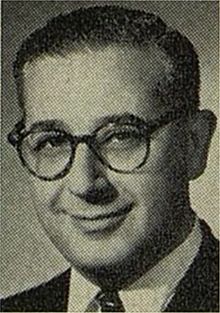
Edward Dmytryk was a Canadian-born American film director and editor. He was known for his 1940s noir films and received an Oscar nomination for Best Director for Crossfire (1947). In 1947, he was named as one of the Hollywood Ten, a group of blacklisted film industry professionals who refused to testify to the House Un-American Activities Committee (HUAC) in their investigations during the McCarthy-era Red Scare. They all served time in prison for contempt of Congress. In 1951, however, Dmytryk testified to the HUAC and named individuals, including Arnold Manoff, whose careers were then destroyed for many years, to rehabilitate his own career. First hired again by independent producer Stanley Kramer in 1952, Dmytryk is likely best known for directing The Caine Mutiny (1954), a critical and commercial success. The second-highest-grossing film of the year, it was nominated for Best Picture and several other awards at the 1955 Oscars. Dmytryk was nominated for a Directors Guild Award for Outstanding Directorial Achievement in Motion Pictures.

William Washington Beaudine was an American film director. He was one of Hollywood's most prolific directors, turning out films in remarkable numbers and in a wide variety of genres.

Renault Renaldo Duncan, better known as Duncan Renaldo, was a Romanian-born American actor best remembered for his portrayal of The Cisco Kid in films and on the 1950–1956 American TV series The Cisco Kid.

The Cisco Kid is a fictional character found in numerous film, radio, television and comic book series based on the fictional Western character created by O. Henry in his 1907 short story "The Caballero's Way", published in Everybody's Magazine, v17, July 1907, as well as in the collection Heart of the West (1907). Originally a murderous criminal in O. Henry's story, the Kid was depicted as a heroic Mexican caballero later in films, radio and television adaptations.
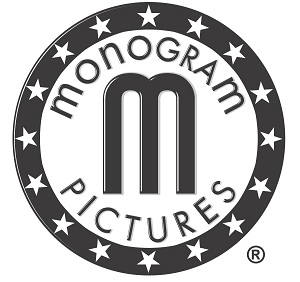
Monogram Pictures Corporation was an American film studio that produced mostly low-budget films between 1931 and 1953, when the firm completed a transition to the name Allied Artists Pictures Corporation. Monogram was among the smaller studios in the golden age of Hollywood, generally referred to collectively as Poverty Row. Lacking the financial resources to deliver the lavish sets, production values, and star power of the larger studios, Monogram sought to attract its audiences with the promise of action and adventure.

Sam Katzman was an American film producer and director. Katzman's specialty was producing low-budget genre films, including serials, which had disproportionately high returns for the studios and his financial backers.

Stanley Clements was an American actor and comedian, best known for portraying "Stash" in the East Side Kids film series, and group leader Stanislaus "Duke" Coveleskie in The Bowery Boys film series.

Noel Darleen Neill was an American actress. She played Lois Lane in the film serials Superman (1948) and Atom Man vs. Superman (1950), as well as the 1950s television series Adventures of Superman. She appeared in 80 films and television series in her career.
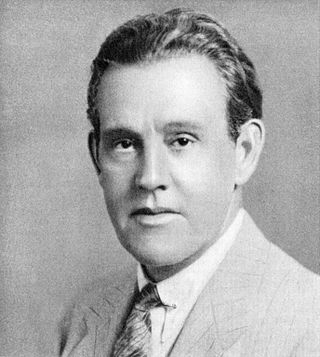
Sidney Toler was an American actor, playwright, and theatre director. The second European-American actor to play the role of Charlie Chan on screen, he is best remembered for his portrayal of the Chinese-American detective in 22 films made between 1938 and 1946. Before becoming Chan, Toler played supporting roles in 50 motion pictures, and was a highly regarded comic actor on the Broadway stage.
Oscar Boetticher Jr., known as Budd Boetticher, was an American film director. He is best remembered for a series of low-budget Westerns he made in the late 1950s starring Randolph Scott.

Phil Karlson was an American film director. Later noted as a film noir specialist, Karlson directed 99 River Street, Kansas City Confidential and Hell's Island, all with actor John Payne, in the early 1950s.

The Metro-Goldwyn-Mayer cartoon studio was an American animation studio operated by Metro-Goldwyn-Mayer (MGM) during the Golden Age of American animation. Active from 1937 until 1957, the studio was responsible for producing animated shorts to accompany MGM feature films in Loew's Theaters, which included popular cartoon characters Tom, Jerry, Droopy, Butch, Spike, Tyke, and Barney Bear.
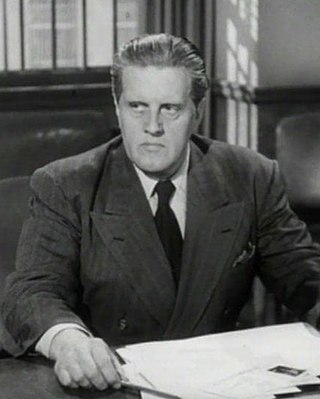
Eugene Oliver Edgar Stutenroth, known profesionally as Gene Roth, was an American film actor and film manager.
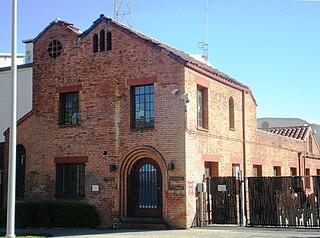
The KCET Studios, located at 4401 Sunset Boulevard in Hollywood, California is the longest continuously-producing studio in Hollywood. Since its establishment in 1912, the studios located at the site have been the home of motion picture producers, including Lubin, Essanay, Willis and Inglis, J.D. Hampton, Charles Ray, Ralph Like, Monogram Pictures, Allied Artists, and ColorVision. Since 1970, it has been the home of public television station KCET, but in April 2011, KCET announced that it had sold the facility to the Church of Scientology.

The Cisco Kid is a 1950–1956 half-hour American Western television series starring Duncan Renaldo in the title role, the Cisco Kid, and Leo Carrillo as the jovial sidekick, Pancho. The series was syndicated to individual stations, and was popular with children. Cisco and Pancho were technically desperados wanted for unspecified crimes, but were viewed by the poor as Robin Hood figures who assisted the downtrodden when law enforcement officers proved corrupt or unwilling to help. It was also the first television series to be filmed in color, although few viewers saw it in color until the 1960s.

Ira Harry Morgan was an American cinematographer. He successfully transitioned from silent movies to sound films. He filmed famed animal-trainer Frank Buck’s film Tiger Fangs (1943).

Charles G. Clarke ASC was an American cinematographer who worked in Hollywood for over 40 years and was treasurer and president of the American Society of Cinematographers.

The Gay Amigo is a 1949 American Western film starring Duncan Renaldo in the lead role of The Cisco Kid. This film was one entry in a series of Cisco Kid B Westerns produced by Philip N. Krasne. Ziv Television Programs later advanced money to Krasne in order to purchase the television rights for the Cisco Kid. Krasne later produced The O. Henry Playhouse.

The Wisconsin Center for Film and Theater Research (WCFTR) is a major archive of motion picture, television, radio, and theater research materials. Located in the headquarters building of the Wisconsin Historical Society in Madison, Wisconsin, the WCFTR holds over three hundred collections from motion picture, television, and theater writers, producers, actors, designers, directors, and production companies. These collections include business records, personal papers, scripts, photographs, promotional graphics, and some twenty thousand films and videotapes of motion picture and television productions.

Jack J. Gross was a motion picture and television producer.
